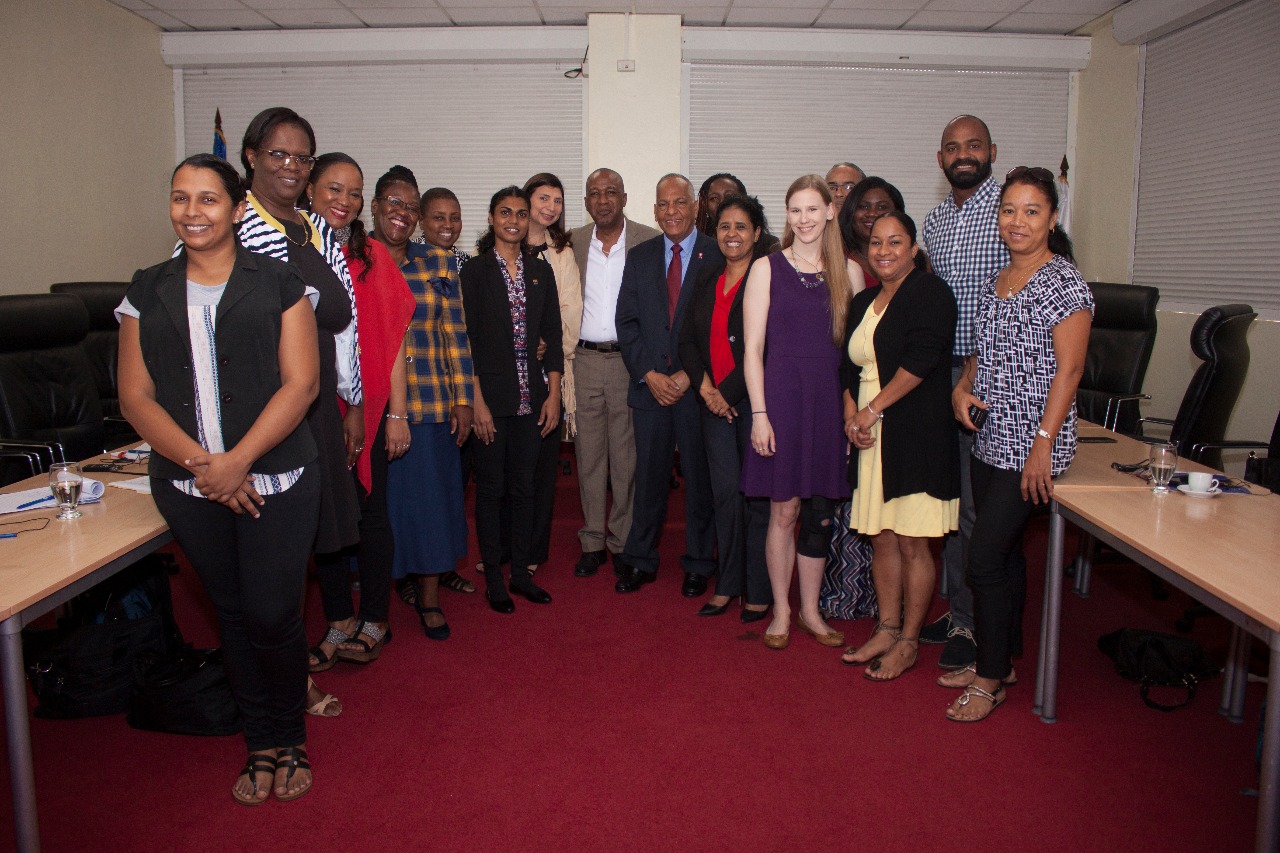
PANCAP aims to enhance HIV prevention, care, treatment and support with Knowledge Exchange EventMulti-disciplinary team from Guyana, Jamaica, Suriname and the Republic of Trinidad and Tobago exposed to Dominican Republic's successful model of care.
Monday, 11 June 2018 (PANCAP Coordinating Unit, CARICOM Secretariat): The Pan-Caribbean Partnership against HIV and AIDS (PANCAP), the mechanism that provides a structured and unified approach to the Caribbean’s response to the HIV epidemic, collaborated with the Integral Orientation and Research Center/ Centro de Orientación e Investigación Integral (COIN) for a face-to-face knowledge exchange event in Santo Domingo, Dominican Republic from 4-8 June 2018.
COIN is a social interest institution based in the Dominican Republic that implements HIV prevention, care, treatment and support programmes for key populations. The entity has been a key partner of the Ministry of Public Health and Social Assistance (Dominican Republic) and grassroots, community-based organizations in service delivery.
The objective of the knowledge exchange event was to provide participants with first-hand experience of COIN’s operations. This included a detailed explanation of how the entity has coordinated and collaborated with the Ministry of Health, other civil society organizations and stakeholders in delivering comprehensive HIV services in communities and to key populations.
Ten persons from four countries, Jamaica, Guyana, Suriname and the Republic of Trinidad and Tobago, were involved in the learning exchange event. The team consisted of National AIDS Programme Managers, civil society organization (CSO) representatives, HIV clinicians and social workers.
The event encompassed participants engaging with officials of the Ministry of Public Health and Social Assistance, the National HIV response and community-based organizations through site visits to clinics and outreaches.
The learning exchange was spearheaded by Dr. Shanti Singh-Anthony, PANCAP Knowledge Management Coordinator, who stated “there was a wealth of knowledge to be shared with our participants on the Dominican Republic’s national HIV response and COIN’s experience of service delivery, prioritization of key populations and their collaboration with the Ministry of Public Health and Social Assistance and other in-country partners”.
She further explained that the goal of the knowledge exchange was to share successful models of care delivery in reaching key populations with prevention, Antiretrovirals (ARTs) and support services at the national level and for participants to understand the intersection with community-based models.
“Our objective was for participants to experience successful interventions by COIN aimed at reducing stigma and discrimination among key populations”, stated Dr. Singh-Anthony, “and to expose them to the components of COIN’s Pre-Exposure Prophylaxis (PrEP) programme as a new prevention modality”.
She further stated that another critical objective was for participants to understand the degree and mechanisms of coordination and collaboration between COIN, the Dominican Republic Ministry of Public Health and Social Assistance, civil society organizations and other stakeholders in supporting the scale-up of HIV prevention, care and treatment services to key populations.
Dr. Singh-Anthony highlighted that the activity also facilitated knowledge sharing and exchange among the participants on the Joint United Nations Programme on HIV and AIDS (UNAIDS) 90-90-90 Targets and World Health Organization “Treat All” recommendation.
Participants were also challenged to develop country-specific action plans to enhance in-country collaboration among members of the multidisciplinary team. “The true measure of success will be the degree to which participants implement COIN’s model of care and other best practices within their country context,” stated Dr. Singh-Anthony, “we would have succeeded when this highly successful model is utilized to improve HIV prevention services to key populations across the region”.
-ENDS –
What is PANCAP?
PANCAP is a Caribbean regional partnership of governments, regional civil society organisations, regional institutions and organisations, bilateral and multilateral agencies and contributing donor partners which was established on 14 February 2001. PANCAP provides a structured and unified approach to the Caribbean’s response to the HIV epidemic, coordinates the response through the Caribbean Regional Strategic Framework on HIV and AIDS to maximise efficient use of resources and increase impact, mobilises resources and build capacity of partners.
What are the Joint United Nations Programme on HIV and AIDS (UNAIDS) 90-90-90 Targets?
- By 2020, 90% of all people living with HIV will know their HIV status.
- By 2020, 90% of all people with diagnosed HIV infection will receive sustained antiretroviral therapy.
- By 2020, 90% of all people receiving antiretroviral therapy will have viral suppression.
Contact:
Timothy Austin
Communications Specialist
PANCAP Coordinating Unit
CARICOM Secretariat
Turkeyen, Greater Georgetown, Guyana
Email: taustin.consultant@caricom.org
Tel: (592) 222-0001-75, Ext. 3409 | Visit www.PANCAP.org
WHAT IS PANCAP?
PANCAP is a Caribbean regional partnership of governments, regional civil society organisations, regional institutions and organisations, bilateral and multilateral agencies and contributing donor partners established on 14 February 2001. PANCAP provides a structured and unified approach to the Caribbean’s response to the HIV epidemic, and coordinates the response through the Caribbean Regional Strategic Framework on HIV and AIDS to maximise efficient use of resources and increase impact, mobilise resources and build the capacity of partners.
What are the Global AIDS Strategy 2021–2026 targets and commitments?
If targets and commitments in the strategy are achieved:
- The number of people who newly acquire HIV will decrease from 1.7 million in 2019 to less than 370 000 by 2025
- The number of people dying from AIDS-related illnesses will decrease from 690 000 in 2019 to less than 250 000 in 2025.
- The goal of eliminating new HIV infections among children will see the number of new HIV infections drop from 150,000 in 2019 to less than 22,000 in 2025.
What are the 95-95-95 Targets for ending AIDS?
- 95% of People Living with HIV know their HIV status;
- 95% of people who know their status on treatment; and
- 95% of people on treatment with suppressed viral loads.
HELPFUL LINKS:
Global AIDS Strategy 2021–2026, End Inequalities, End AIDS
https://pancap.org/pancap-documents/global-aids-strategy-2021-2026-end-inequalities-end-aids/
Caribbean Regional Strategic Framework on HIV and AIDS (CRSF) 2019-2025
https://pancap.org/pancap-documents/caribbean-regional-strategic-framework-2019-2025/
